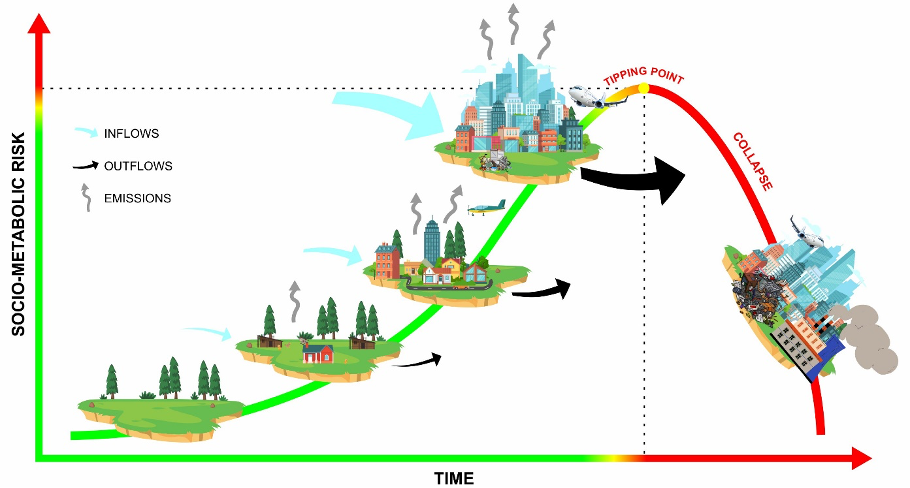By Francisco Xavier Felix Martin del Campo (ISIE profile)
Our resource-use dynamics is posited as an important example of complex systems in need for better understanding. These have contributed significantly to the improvement in global material standards of living through the provisioning of essential societal services, while also impacting on the already limited natural resource-base of the Earth system on which we depend. For resource-stressed settings like small islands, the analysis of these complex dynamics is not only crucial but urgent. My thesis aims at analyzing the resource-use dynamics from a socio-metabolic research perspective in the context of Caribbean small islands as a potential lever in realizing the transition to a sustainable, resilient, and resource-secure system. Specifically, the thesis analyzes risk-related resource dynamics in small islands’ socio-economic systems as an approach to enhance resource security, reduce socio-metabolic risks, and build system’s resilience.
Socio-metabolic risks are systemic risks related to critical resource availability, material circulation integrity, and (in)equities in cost and benefit distributions. Specific resource-use dynamics could quickly lead to severe metabolic risks and cascading effects and become a metabolic trap, which in turn can inhibit progress towards greater resource security, self-reliance, and the system’s ability to deliver necessary societal services. In some instances where high metabolic risk exist, the system’s ability to organize its own social metabolism is severely compromised, thus potentially leading to the system’s socio-metabolic collapse. A socio-metabolic collapse is usually characterized by crossing a threshold or tipping point defined as a point at which the number of small changes or over a period of time reaches a level where a further small change has a sudden and very great effect on a system that is oftentimes irreversible.

Conceptual figure of tipping points and system’s socio-metabolic collapse due to increased socio-metabolic risks
The dissertation is based on three journal articles. The first focuses on a set of Caribbean small islands and analyzes the shifting resource-baselines of three essential resources (water, energy, and food) and their nexus. We can observe a regional declining trend of resources availability and self-sufficiency. At the same time, the access to and consumption of these three resources have increased in the population. Different natural anthropogenic and natural drivers exacerbate the system’s vulnerabilities and the exposure to risks, which could lead to cascading dysfunction and eventual breakdown of the biophysical basis of island systems. This paper emphasizes the intra- and interconnected nature between essential resources and socio-metabolic risk, which builds the foundations for deeper analysis on current and future sustainability in small islands.
The second paper identifies and analyzes the size and make-up of resource flows and circularity potentials for The Bahamas. The analysis demonstrates that a linear, undiversified metabolism, with high accumulation of resources in specific urban centres, and heavy imports dependency could further expose the system to socio-metabolic risks, including higher waste generation, overexploitation and resource depletion, and health/ecosystem degradation, among others. This paper also brings important quantitative and qualitative insights on the potentials that reconfigured resource-use patterns may offer to minimizing or reducing socio-metabolic risk in small islands.
The third article also focuses on The Bahamas and analyzes the role that the composition and dynamics of material stocks and environmental threats like sea-level rise play in driving resource-use and in furthering sustainable development. Deficiencies in urban planning and territorial ordering contribute to hotspots of material stocks located in flood zones, with uneven infrastructure development areas across the islands. This could compromise the integrity of current and future material stocks in case of extreme events and sea-level rise, and limit the development potential of the less developed territories due to lack of infrastructure, among others. This paper emphasizes the need for flexible and robust policy frameworks to hasten long-term development planning and climate change adaptation strategies to build system’s resilience.
The overall framework of this thesis highlights that sustainable resource management is integral to properly manage systemic risks, especially in resource-stressed context like small islands. Also, mitigating socio-metabolic risks by reconfiguring resource-use patterns can be a crucial adaptation strategy. In particular, sustainable development will require a focus on the built environment as it has a critical role in the maintenance and creation of services, in driving material flows, in mitigating socio-metabolic risks and in advancing sustainability. This thesis encourages for the development and application of holistic long-term resource management strategies that are inclusive, flexible, adaptive and that are supported by an effective regulatory and institutional framework that allows for context-specific implementations.
Full paper citations:
Martin del Campo, F., Singh, S.J., Mijts, E. (2023). “The resource (in)sufficiency of the Caribbean: Analyzing socio-metabolic Risks (SMR) of Water, Energy, and Food”. Frontiers in Climate. Submission date: October 31, 2022
Martin del Campo, F., Singh, S. J., Fishman, T., Noll, D., Thomas, A., & Drescher, M. (2023). “Can a Small Island Nation Build Resilience? The Significance of Resource-use Patterns and Socio-Metabolic Risks in The Bahamas”. Journal of Industrial Ecology, 1-17. https://doi.org/10.1111/jiec.13369
Martin del Campo, F., Singh, S. J., Fishman, T., Thomas, A., & Drescher, M. (2023). “The Bahamas at risk: Material stocks, sea-level rise, and the implications for development”. Journal of Industrial Ecology. Submission date: February 11, 2023
